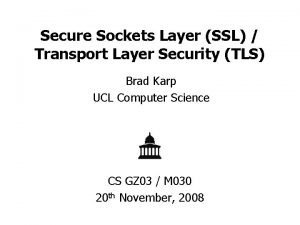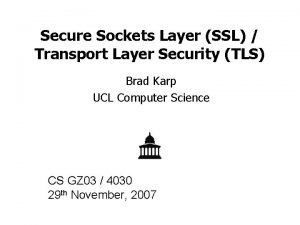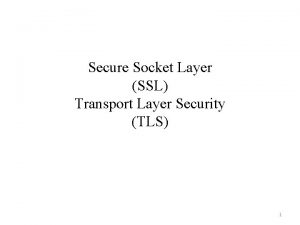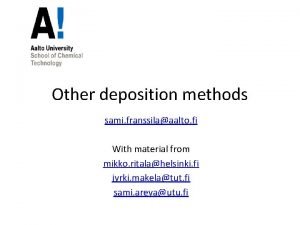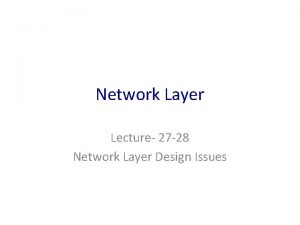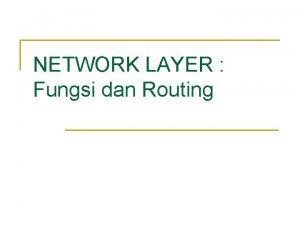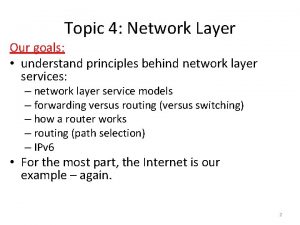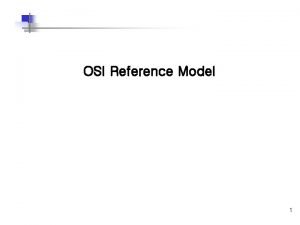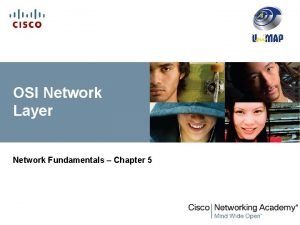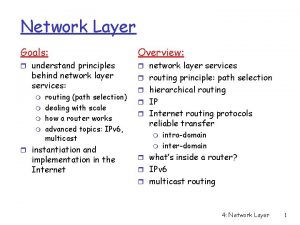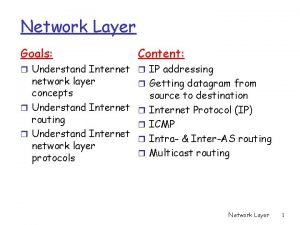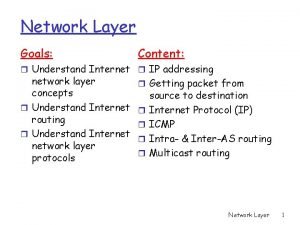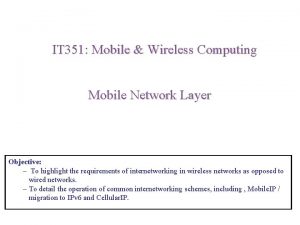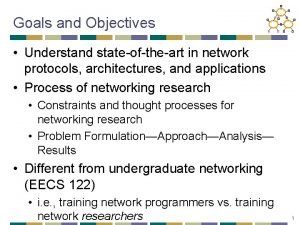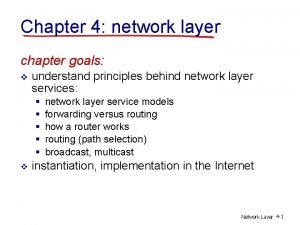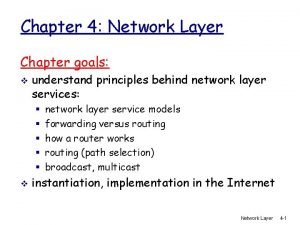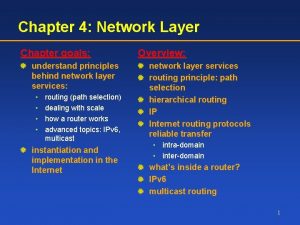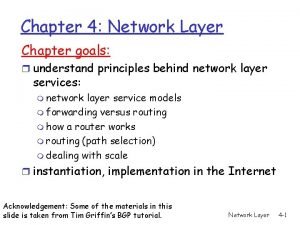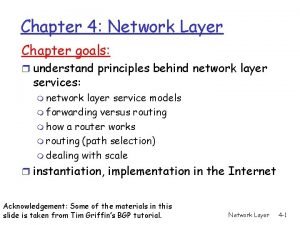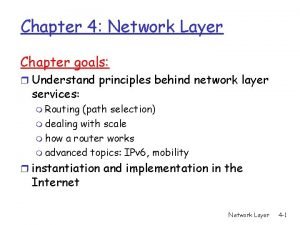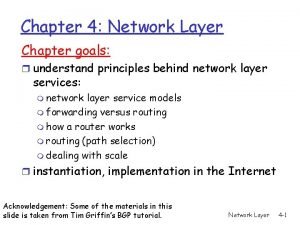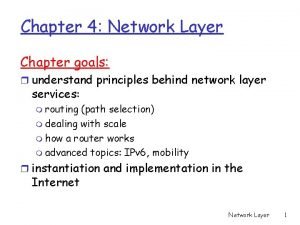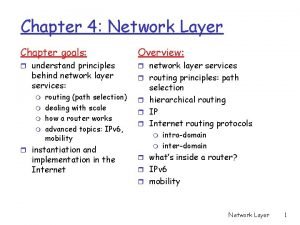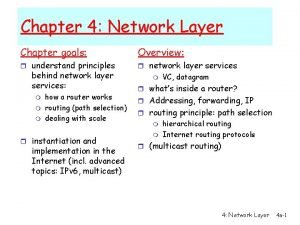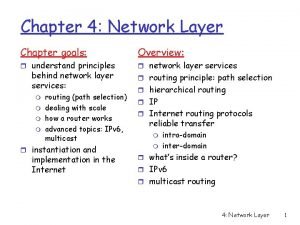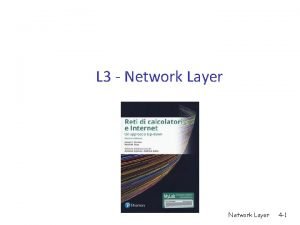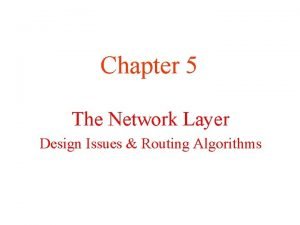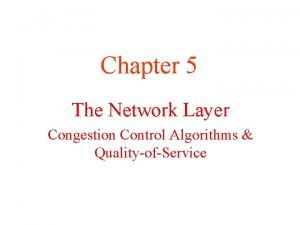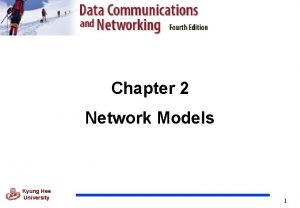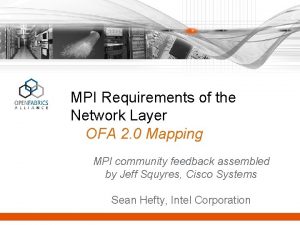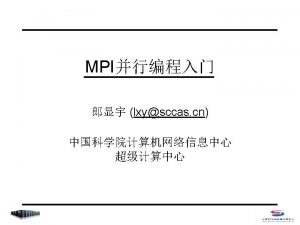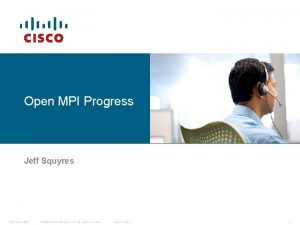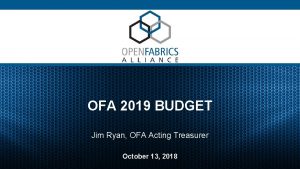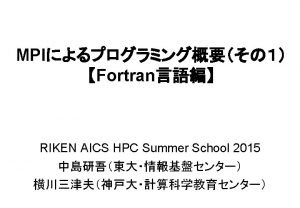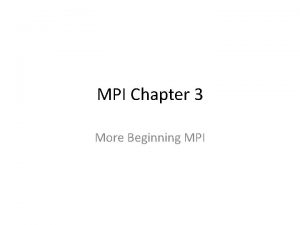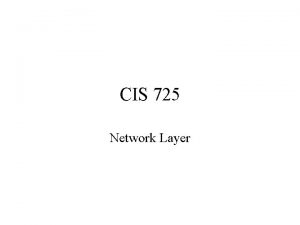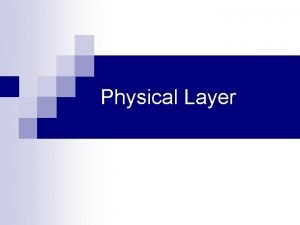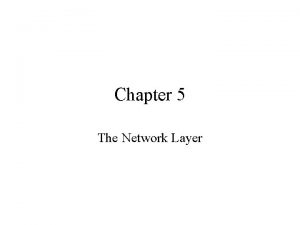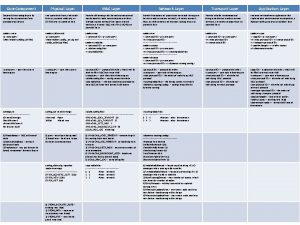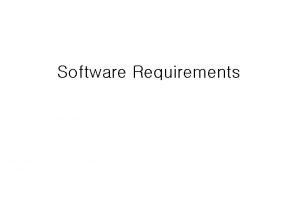MPI Requirements of the Network Layer OFA 2













































- Slides: 45

MPI Requirements of the Network Layer OFA 2. 0 Mapping MPI community feedback assembled by Jeff Squyres, Cisco Systems Sean Hefty, Intel Corporation

Basic things MPI needs • Messages (not streams) – msg and tagged message APIs • Efficient API – Allow for low latency / high bandwidth – Low number of instructions in the critical path • Direct access to provider • Calls associated with objects (endpoints, event queues) • Provider can dynamically adjust function pointers based on object configuration – Enable “zero copy” • Depends on provider implementation and HW support

Basic things MPI needs • Separation of local action initiation and completion – Data transfers are asynchronous • One-sided (including atomics) and two-sided semantics – One-sided support – RMA and atomics – Two-sided – msg and tagged messags • No requirement for communication buffer alignment – Atomics must be naturally aligned based on their type

Basic things MPI needs • Asynchronous progress independent of API calls Process MPI PGAS libfabric handles – Including asynchronous progress from multiple consumers (e. g. , MPI Also causes and PGAS in the same Progress progress of these process) of these • Document as provider implementation – Preferably via within a single instantiation dedicated hardware • requirement Progress support is exposed by provider, but proposed API needs refining

Basic things MPI needs • Scalable communications with millions of peers – With both one-sided and two-sided semantics – Think of MPI as a fully-connected model (even though it usually isn’t implemented that way) – Today, runs with 3 million MPI processes in a job • Move from ‘QP’ to ‘endpoint’ interface – Endpoint may consist of multiple send/receive queues – Endpoint type includes ‘reliable datagram message’ • Introduce ‘address vector’ – Enable bulk address resolution – Reduce memory required to address remote nodes – Share vector among multiple processes

Things MPI likes in verbs • (all the basic needs from previous slide) • Different modes of communication – Reliable vs. unreliable – Scalable connectionless communications (i. e. , UD) • Endpoint exposes generic type, protocol capabilities (e. g. RDMA support), and low-level protocol – Support vendor/provider specific protocols – HW and SW protocols

Things MPI likes in verbs • Specify peer read/write address (i. e. , RDMA) – RMA operations supported • RDMA write with immediate (*) – – …but we want more (more on this later) RMA with immediate supported API increase immediate to 64 -bit Could use SGL for arbitrary immediate data size • E. g. First or last SGE provides immediate data

Things MPI likes in verbs • Ability to re-use (short/inline) buffers immediately – FI_BUFFERED_SEND flag – May be implemented as inline data or copied to preregistered memory • Polling and OS-native/fd-based blocking QP modes – Support for multiple wait objects with control interface to obtain native wait object (e. g. fd)

Things MPI likes in verbs • Discover devices, ports, and their capabilities (*) – …but let’s not tie this to a specific hardware model • Discovery is built around fi_getinfo call – Need to determine if interface is sufficient • Fabric and domain objects – Higher-level of abstraction than verbs – Need to identify application desired attributes

Things MPI likes in verbs • Scatter / gather lists for sends – Supported via IOV format • struct iovec, struct fi_iomv – Extensible to other IOV formats (not defined) • E. g. strided operations, • Atomic operations (*) – …but we want more (more on this later) – Define a complete set of atomic operations • 8 -64 bit ints, float, double, complex, etc. • min, max, sum, prod, and, or, swap, etc. – Query mechanism to determine provider support

Things MPI likes in verbs • Can have multiple consumers in a single process – API handles are independent of each other Process Library A Library B Handle A Handle B • Support multiple providers Network hardware

Things MPI likes in verbs • Ability to connect to “unrelated” peers – Active/passive endpoints – CM operations (connect, listen, accept) • Cannot access peer (memory) without permission – Protection keys exposed (as 64 -bits) – Memory registration required for RMA target memory

Things MPI likes in verbs • Ability to block while waiting for completion –. . . assumedly without consuming host CPU cycles – User specifies wait object and signaling type – fi_ec_wait_obj, fi_ec_wait_cond • Cleans up everything upon process termination – E. g. , kernel and hardware resources are released – Linux kernel requirement

Other things MPI wants (described as verbs improvements) • MTU is an int (not an enum) – TBD – will be an int – Currently exposed through control interface • Specify timeouts to connection requests – Design is to use administrative interface for timeout • E. g. /etc/rdma/fabric/def_conn_timeout • Control interface may be use to override defaults – Kernel support for very long timeouts (e. g. MRA) – …or have a CM that completes connections asynchronously • Application intervention to configure connected endpoints is desirable for performance reasons

Other things MPI wants (described as verbs improvements) • All operations need to be non-blocking, including: – Address handle creation • Address vector operation is asynchronous – Communication setup / teardown • CM operations are asynchronous – Memory registration / deregistration • Asynchronous registration • Deregistration is lazy, but may be forced to complete using sync operation

Other things MPI wants (described as verbs improvements) • Specify buffer/length as function parameters – Specified as struct requires extra memory accesses – …more on this later – Data transfer operations include calls that take the buffer/length as parameters • Ability to query how many credits currently available in a QP – To support actions that consume more than one credit – TBD • will START/END flags work? reserve queue/credits? – Application can track credits – Which level should operation queuing occur?

Other things MPI wants (described as verbs improvements) • Remove concept of “queue pair” – Have standalone send channels and receive channels – Defines endpoint, with send and/or receive capabilities – Association between send and receive channels needed for connection-oriented communication – Endpoint has data transfer ‘flows’ • Flow could map to a different queue or priority level

Other things MPI wants (described as verbs improvements) • Completion at target for an RDMA write – fid_mr – memory regions have operations – MR may be associated with an event queue – Supports event generation against MRs • Have ability to query if loopback communication is supported – clarify – Anticipate that loopback support will be a requirement for the provider

Other things MPI wants (described as verbs improvements) • Clearly delineate what functionality must be supported vs. what is optional – Example: MPI provides (almost) the same functionality everywhere, regardless of hardware / platform – Verbs functionality is wildly different for each provider – First cut at provider requirements documented – TBD – support dynamically determining what optional functionality is provided – fi_getinfo – app requests desired functionality, and provider only responds when met

Other things MPI wants (described as verbs improvements) • Better ability to determine causes of errors • In verbs: – Different providers have different (proprietary) interpretations of various error codes – Difficult to find out why ibv_post_send() or ibv_poll_cq() failed, for example • Perhaps a better strerr() type of functionality (that can also obtain provider-specific strings)? • fi_errno – extended error code values (errno+) • fi_ec_err_entry: prov_errno, prov_data • EC strerror() operation – provider specific

Other things MPI wants: Standardized high-level interfaces • Examples: – Tag matching • tag matching operations – MPI non-blocking collective operations (TBD) • TBD • Idea for triggered operations – Remote atomic operations • atomic operations defined – …etc. – The MPI community wants input in the design of these interfaces • APIs will be fully documented (man pages) and reviewed

Other things MPI wants: Standardized high-level interfaces • Divided opinions from MPI community: – Providers must support these interfaces, even if emulated • Enable provider support, but cannot require it – Market demand must push vendors • Support for proprietary protocols allows for SW implementations – Exposed to apps for interoperability – Framework can provide common implementation » E. g. tag matching over message queues, MR cache – Run-time query to see which interfaces are supported • protocol_cap identifies supported interfaces

Other things MPI wants: Vendor-specific interfaces • Direct access to vendor-specific features – Lowest-common denominator API is not always enough – Allow all providers to extend all parts of the API • Provider specific operations supported • Provider reserved data values (enums, flags, etc. ) • Implies: – Robust API to query what devices and providers are available at run-time (and their various versions, etc. ) – Compile-time conventions and protections to allow for safe non-portable codes • FI_DIRECT allows building against a specific provider • #define capability flags to support compile time optimizations • This is a radical difference from verbs

Core libfabric functionality Application (e. g. , MPI) Direct function calls to libfabric core Provider A Provider B

Example options for direct access to vendor-specific functionality Application (e. g. , MPI) Example 1: Access to Provider A libfabric core provider A extensions without going through libfabric Provider core A B

Example options for direct access to vendor-specific functionality Application (e. g. , MPI) • Applications have direct access Example 2: to providers for all calls but Access to provider B small group of core calls libfabric core extensions via “pass (fi_getinfo, fi_fabric) through” functionality • No common path through core in libfabric • Core provides helper functions that providers may use Provider B with A extensions

Other things MPI wants: Regarding memory registration • Run-time query: is memory registration is necessary? – I. e. , explicit or implicit memory registration – capability flag – Captured in IOV format • If explicit – Need robust notification of involuntary memory deregistration (e. g. , munmap) – TBD – not defined – Supports events on a MR • If the cost of de/registration were “free”, much of this debate would go away – Enable provider to hide registration (cache, on-demand)

Other things MPI wants: Regarding fork() behavior • In child: – All memory is accessible (no side effects) – Network handles are stale / unusable – Can re-initialize network API (i. e. , get new handles) • In parent: – All memory is accessible – Network layer is still fully usable – Independent of child process effects • TBD – any effect on API?

Other things MPI wants • If network header knowledge is required: – Provide a run-time query • Header is determined by endpoint protocol – Do not mandate a specific network header – E. g. , incoming verbs datagrams require a GRH header • GRH will be hidden by default – IB routing does not exist – Provider can direct to discard buffer – Use setopt function to expose GRH • TBD – exposing source address is non-trivial – May require lookups, (IB source data is incomplete)

Other things MPI wants • Request ordered vs. unordered delivery – Potentially by traffic type (e. g. , send/receive vs. RDMA) – Endpoint type defines some ordering requirements – TBD – ordering is defined by protocol • Need generic ordering requirements or controls • Completions on both sides of a remote write – MR may be bound to event queues

Other things MPI wants • Allow listeners to request a specific network address – Similar to TCP sockets asking for a specific port – fi_getinfo: src_addr allows specifying transport and/or network address – Support for multiple address formats (IP, IPv 6, IB) • Allow receiver providers to consume buffering directly related to the size of incoming messages – Example: “slab” buffering schemes – FI_MULTI_RECV flag indicates that a posted buffer may be used to receive multiple messages – fi_ec_data_entry: buf can support this – Buffer is released when next receive does not fit or fully consumed (free space drops beneath some threshold)

Other things MPI wants • Generic completion types. Example: – Aggregate completions • FI_EC_COUNTER – event counter type – Vendor-specific events • fi_ec_format – provider specific event formats available • Out-of-band messaging – TDB – clarify, URGENT data? – fi_msg: flow – endpoints may be associated with multiple data flows, selectable by the user

Other things MPI wants • Noncontiguous sends, receives, and RDMA opns. – fi_iov_format – extensible to other formats • Page size irrelevance – Send / receive from memory, regardless of page size – Page size not exposed – Provider may have alignment restrictions • FI_MULTI_RECV? – TBD – expose other size restrictions • packet limits, operation limits (RMA, MR)

Other things MPI wants • Access to underlying performance counters – For MPI implementers and MPI-3 “MPI_T” tools – TBD – only control interface defined – Need to identify desired counters • Per endpoint? per device? user or kernel service (file)? • Set / get network quality of service – TBD – endpoint getopt/setopt operations – Qo. S / To. S not defined

Other things MPI wants: More atomic operations • Datatypes (minimum): int 64_t, uint 64_t, int 32_t, uint 32_t – Would be great: all C types (to include double complex) – Would be ok: all <stdint. h> types – Don’t require more than natural C alignment – fi_datatype - all types defined

Other things MPI wants: More atomic operations • Operations (minimum) – accumulate, fetch-and-accumulate, swap, compare-andswap • Accumulate operators (minimum) – add, subtract, or, xor, and, min, max • fi_op – large set of operators defined – Provider can convert fi_datatype / fi_op using lookup table • Run-time query: are these atomics coherent with the host? – If support both, have ability to request one or the other – FI_WRITE_COHERENT flag with fi_ep_sync() if not

Other things MPI wants: MPI RMA requirements • Offset-based communication (not address-based) – Performance improvement: potentially reduces cache misses associated with offset-to-address lookup – TBD – support user selected fabric address (~riomap) – Modify or extend MR operations • Programmatic support to discover if VA based RMA performs worse/better than offset based – – Both models could be available in the API But not required to be supported simultaneously TBD - clarify Provider could support multiple APIs, which may not perform equally – Intent is for provider to return fi_info in order of preference • fi_info may need capability mask

Other things MPI wants: MPI RMA requirements • Aggregate completions for MPI Put/Get operations – Per endpoint – Per memory region • Event counters may be associated with endpoints and MR’s (and other fabric objects)

Other things MPI wants: MPI RMA requirements • Ability to specify remote keys when registering – Improves MPI collective memory window allocation scalability – MR operation – FI_USER_MR_KEY cap flag • Ability to specify arbitrary-sized atomic ops – Run-time query supported size – Supports common data type sizes, and arrays of those sizes – Query support for a given size and array count

Other things MPI wants: MPI RMA requirements • Ability to specify/query ordering and ordering limits of atomics – – Ordering mode: rar, raw, war and waw Example: “rar” – reads after reads are ordered Protocol defines ordering TBD – document ordering between operations (message queue, RMA, atomics, etc. ) – TBD – abstract ordering above low-level protocol

“New, ” but becoming important • Network topology discovery and awareness – …but this is (somewhat) a New Thing – Not much commonality across MPI implementations • Would be nice to see some aspect of libfabric provide fabric topology and other/meta information – Need read-only access for regular users • TBD – fabric object class could expose operations regarding topology – Need to define operations and structures – Rely on extensibility of framework

API design considerations • With no tag matching, MPI frequently sends / receives two buffers – (header + payload) – Optimize for that – TBD – modify or extend API sets • Need details on buffer usage (e. g. FI_BUFFERED_SEND for header buffer) • MPI sometimes needs thread safety, sometimes not – May need both in a single process – TBD – compile time option • Run time configuration option to disable synchronization

API design considerations • Support for checkpoint/restart is desirable – Make it safe to close stale handles, reclaim resources – TBD – determine if this is an API requirement • Provider documented requirement to cleanup user space resources even if kernel fails (key errno? ) – Forcing apps to close all handles prior to checking is highly undesirable

API design considerations • Do not assume: – Max size of any transfer (e. g. , inline) – The memory translation unit is in network hardware – All communication buffers are in main RAM – Onload / offload, but allow for both – API handles refer to unique hardware resources • TBD – determine API requirements

API design considerations • Be “as reliable as sockets” (e. g. , if a peer disappears) – Have well-defined failure semantics • TBD – document failure semantic • Endpoint error state, EQ errors – Have ability to reclaim resources on failure • Closing an object in the error state should succeed • Kernel must cleanup all resources
 Elotoe
Elotoe Acetabular rim
Acetabular rim Lettere unibo piano didattico
Lettere unibo piano didattico Pigmented layer and neural layer
Pigmented layer and neural layer Phases of deglutition
Phases of deglutition Secure socket layer and transport layer security
Secure socket layer and transport layer security Presentation layer functions
Presentation layer functions Secure socket layer and transport layer security
Secure socket layer and transport layer security Secure socket layer and transport layer security
Secure socket layer and transport layer security Secure socket layer and transport layer security
Secure socket layer and transport layer security Layer 2 e layer 3
Layer 2 e layer 3 Layer-by-layer assembly
Layer-by-layer assembly Layer 2 vs layer 3 bitstream
Layer 2 vs layer 3 bitstream Network layer design
Network layer design Network layer is concerned with
Network layer is concerned with Fungsi dari network layer
Fungsi dari network layer Implementation of connectionless service
Implementation of connectionless service Introduction to network layer
Introduction to network layer 5 layer network model
5 layer network model Two layer network
Two layer network Goals of network layer
Goals of network layer The basic unit of a physical network (osi layer 1) is the:
The basic unit of a physical network (osi layer 1) is the: Goals of network layer
Goals of network layer Goals of network layer
Goals of network layer Goals of network layer
Goals of network layer Goals of network layer
Goals of network layer Goals of network layer
Goals of network layer Mobile network layer
Mobile network layer Networking goals and objectives
Networking goals and objectives Goals of network layer
Goals of network layer Goals of network layer
Goals of network layer Goals of network layer
Goals of network layer Goals of network layer
Goals of network layer Goals of network layer
Goals of network layer Goals of network layer
Goals of network layer Goals of network layer
Goals of network layer Goals of network layer
Goals of network layer Goals of network layer
Goals of network layer Goals of network layer
Goals of network layer Goals of network layer
Goals of network layer Path determination in network layer
Path determination in network layer Horizontal
Horizontal Network layer design issues in computer networks
Network layer design issues in computer networks Congestion control in network layer
Congestion control in network layer Address cont'd
Address cont'd Osi layer ftp
Osi layer ftp







